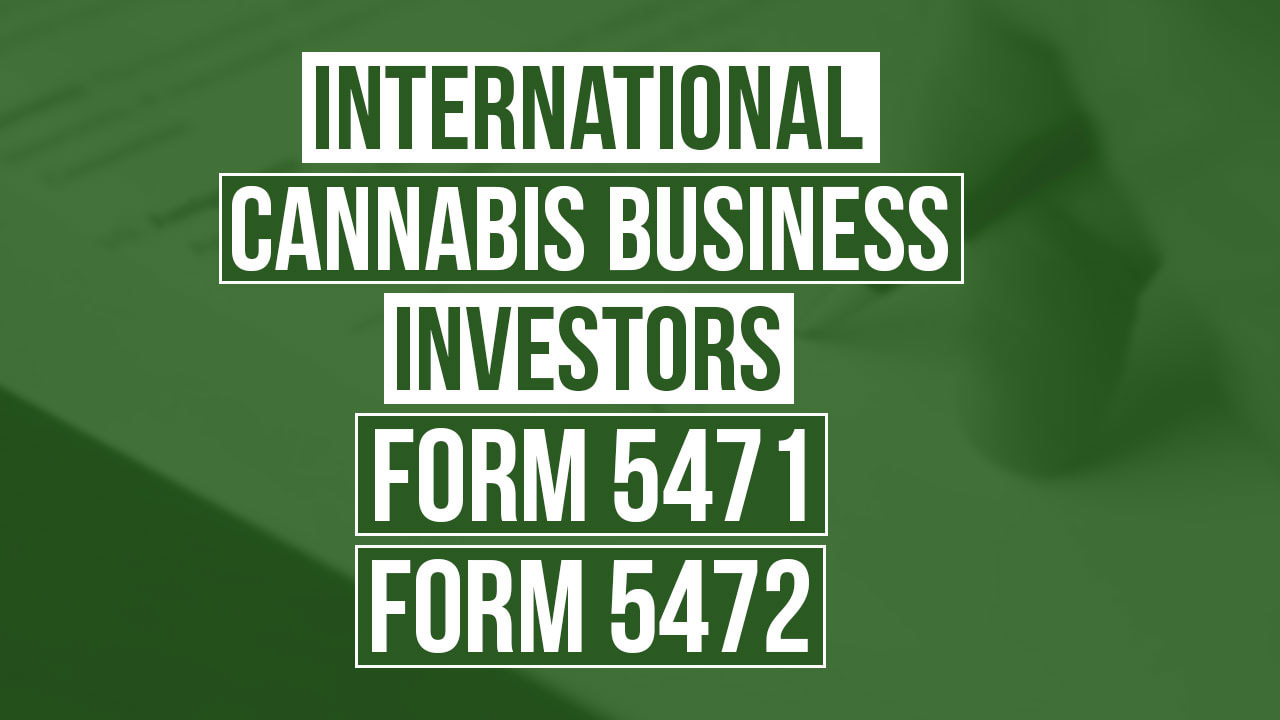|
Anecdotally, we know that foreign investment in the US Cannabis industry is very commonplace. This is a growing market that’s attracting lots of attention from firms in Canada and overseas. However, partnering your cannabis operation with foreign investors comes with additional tax reporting requirements. IRS Form 5471 and Form 5472 are two such requirements that come with steep penalties if not filed accurately and on-time.
A lot of foreign investors don’t know about these specific filing requirements. If you’re a cannabis entrepreneur with ties to the US market, make sure you avoid high fees and file these forms before the July deadline. Form 5472: What is it?
IRS Form 5472 is what is known as an “information form” that provides information for any businesses that have owners, partners, or shareholders from another, non-US country. Businesses, including cannabis businesses, must disclose all transactions with international partners, owners and shareholders. This form is required to be submitted annually for C Corps and LLCs with at least 25% foreign ownership, shareholders, or partners.
The penalty for not filing the IRS Form 5472, or for filing it late, used $10,000 – but, since 2017, that fee has increased to $25,000. The IRS requires this form to make sure no one is avoiding paying taxes on transactions between US and foreign participants. Ultimately, its aim is to stop foreign tax evasion and money laundering. It also prevents companies from benefiting from tax exemptions for which they aren’t eligible. What is Form 5471?
IRS Form 5471 has a similar informational purpose as Form 5472, but applies for foreign companies owned by US persons. US citizens and green card holders who own at least 10% in a foreign corporation, must file Form 5471, even if they are living overseas.
Who has to file this form? It is required of any US persons who are “officers, directors, or shareholders in a foreign corporation.” Foreign corporation is defined as a legal entity formed under the laws of any country other than the US. It doesn’t matter whether your business entity qualifies as an LLC for US tax purposes – “US tax rules stipulate that any non-US entity will be classified as a corporation by default if all owners have limited liability,” explains one expert. The penalties for not filing the 5471 are incredibly high. You will be fined $10,000 for each tax year you fail to provide the information requested on the form, plus an additional $10,000 fine if the information is not provided within 90 days of the IRS providing a notice of failure. Thereafter, there’s a fee of $10,000 for every 30 days until the information is filed. What is a reportable transaction?
Form 5472 asks for “reportable transactions”. A reportable transaction is “any exchange of money or property with the foreign shareholder such as a payment for sales, rents, royalties, interest.” The payment of dividends does not qualify as a reportable transaction. For a cannabis company some transactions you may have had that you would include are:
If you’re wondering who qualifies as a related party, this term covers any direct or indirect foreign shareholder that owns at least 25% of the reporting corporation, as well as a range of other entities that meet the tax definition of “related”. This is a broad term, and if you have doubts, it’s best to speak to a qualified CPA. Can you apply for penalty abatement?
It is possible to apply for a penalty abatement, but beware: in most cases, this is rarely granted. If you wish to try your luck, you begin the process by sending a letter to the IRS explaining your situation. The IRS will consider your argument and take around 6 - 8 months to approve your case or not. The stakes are high – it’s better to file your forms on time and avoid this situation altogether. Typically these forms are due with your annual tax return, but as 2020 is a unique situation, you can still file Form 5472 or Form 5471 before the deadline in July.
If you need help with filing your Form 5471 or Form 5471, then please get in touch with our team for assistance. |


